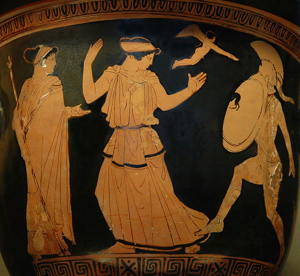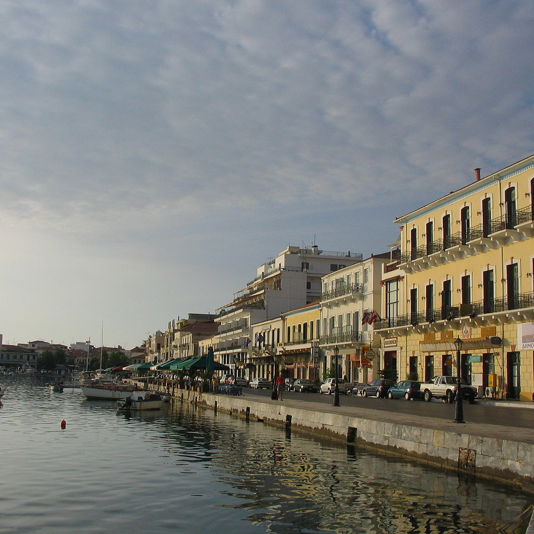Nowadays Gytheio is a calm and secluded town that used to be a seaport for the legendary Sparta and Mystras
As a charming port town on the eastern coast of the Peloponnese, Gytheio has a rich history and a wealth of cultural treasures to explore. Whether you're drawn to its fascinating archaeological sites, stunning beaches, or delicious cuisine, there's something for everyone to enjoy in this beautiful destination.
As you step off your cruise ship and onto the dock at Gytheio, you'll immediately be struck by the town's picturesque setting. Set against a backdrop of rolling hills and crystal-clear waters, Gytheio boasts some of the most stunning scenery in Greece. With a history dating back to ancient times, the town is also home to a wealth of historical landmarks and cultural attractions, making it the perfect place to explore during your Greek island getaway.
One of the town's most famous landmarks is the ancient theater, which dates back to the 3rd century BC. The theater was built during the Hellenistic period and is considered one of the most impressive examples of ancient Greek architecture in the region. Visitors can climb to the top of the theater and take in breathtaking views of the surrounding countryside.
Another must-see attraction in Gytheio is the imposing lighthouse, which stands guard over the harbor and has been a landmark of the town for centuries. The lighthouse was first built in the early 19th century and has since been restored and renovated, making it one of the most impressive structures in the area. Visitors can climb to the top of the lighthouse for panoramic views of the sea and the surrounding landscape.
If you're looking for a taste of local culture and cuisine, Gytheio has plenty to offer. The town is known for its fresh seafood, with many restaurants serving up delicious dishes featuring local catches such as squid, octopus, and sardines. Be sure to also try the town's famous olive oil, which is produced using traditional methods and has a rich, fruity flavor.
For those seeking a more active experience, Gytheio has a wealth of outdoor activities to enjoy. The town is surrounded by beautiful beaches, including the popular Valtaki Beach, which is known for its clear waters and fine sand. Visitors can also take a boat tour of the nearby caves and coves, or hike along the scenic coastal paths.
In conclusion, Gytheio is a truly enchanting destination that has something for everyone to enjoy. Whether you're interested in history, culture, cuisine, or outdoor adventure, this beautiful town on the Peloponnese coast is sure to delight and inspire. So come and explore all that Gytheio has to offer and discover the magic of Greece for yourself!
The founders of ancient Gytheio were Heracles and Apollo.
Cranae island is a place where Paris of Troy and Helen from Sparta spent their first night together before departing for Troy, thus igniting the Trojan War.
The legend has it that Paris was so hasty, that he left there his helmet and that is how the islet took its name (helmet in Greek is “kranos”). Some believe that the name Cranae (Kranai) comes from the legendary king of Athens Kranaos, the as Athens was also known as "Kranaa". According to Homer the word Kranaos has the meanings: 'Rocky', 'ragged', 'hard'.
Lacedaemon was a mythical king of Laconia. The son of Zeus by the nymph Taygete, he married Sparta, the daughter of Eurotas. He named the country after himself and the city after his wife.
The Trojan War, one of the most important events in Greek mythology, was waged against the city of Troy by the Greeks after Paris of Troy took Helen from her husband Menelaus, king of Sparta. Helen was said to have been the most beautiful woman in the world and was promised to Paris by goddess Aphrodite in the Judgement of Paris. Menelaus with his brother Agamemnon, king of Mycenae led Achaean troops to Troy and besieged the city for ten years. After the deaths of many heroes, including the Achaeans Achilles and Ajax, and the Trojans Hector and Paris, the city fell to the ruse of the Trojan Horse.
Lycurgus was the quasi-legendary lawgiver of Sparta who established the military-oriented reformation in Sparta in accordance with the Oracle of Apollo at Delphi. He promoted the three Spartan virtues: equality (among citizens), military fitness, and austerity.
He gave up the kingship of Sparta and transferred it to his brother’s son, travelled a lot, and came back to make reforms:
- Set voting system restricted by council
- Reassigned and equalized of landholdings and wealth among the population,
- Forbade the use of gold and silver, introduced money made of iron
- Required all Spartan men to eat together in common mess halls
- Made new education system: seven-year-old boys were taken from homes to study warfare
- Banned continuous warfare against the same opponents to prevent them from adapting
- Gave women rights and education
- Set Marriage Laws aiming effective childbirth
- And other
But it is possible that "Lycourgos" was only an epithet of the god Apollo.

